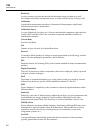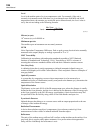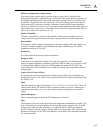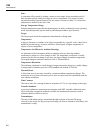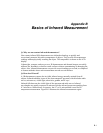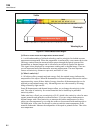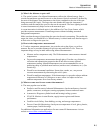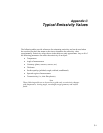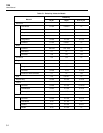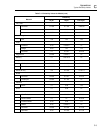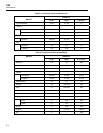B-1
Appendix B
Basics of Infrared Measurement
Q. Why use non-contact infrared thermometers?
Non-contact infrared (IR) thermometers use infrared technology to quickly and
conveniently measure the surface temperature of objects. They provide fast temperature
readings without physically touching the object. The temperature is shown on the LCD
display.
Lightweight, compact, and easy-to-use, IR thermometers and thermal imagers can safely
measure hot, hazardous, or hard-to-reach surfaces without contaminating or damaging the
object. Also, infrared thermometers can provide several readings per second, as compared
to contact methods where each measurement can take several minutes.
Q. How does IR work?
A. IR thermometers capture the invisible infrared energy naturally emitted from all
objects. Infrared radiation is part of the electromagnetic spectrum, which includes radio
waves, microwaves, visible light, ultraviolet, gamma, and X-rays.
Infrared falls between the visible light of the spectrum and radio waves. Infrared
wavelengths are usually expressed in microns with the infrared spectrum extending from
0.7 microns to 1000 microns. In practice, the 0.7 to 14 micron band is used for IR
temperature measurement. Figure B-1 illustrates the infrared measurement region.






